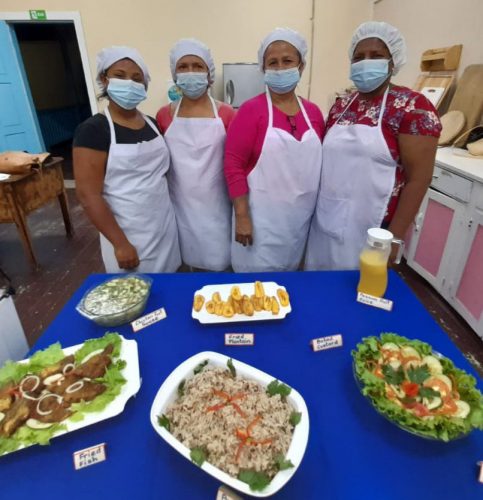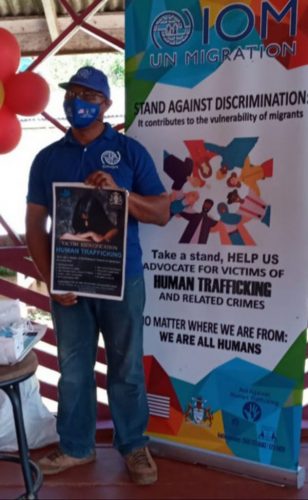Most of the working life of Ivor Melville, Executive Director of the Hope Foundation, has been in delivering public health services in HIV/AIDS and more recently COVID-19 in Bartica and outlying and hinterland communities in Region Seven.
Melville has done this in the absence of medical and public health outreach by the formal health system in those communities.
“Most of my working life, whether paid or voluntary, has been in the field of community-based health, social and youth-friendly services and conducting or facilitating skills training. My involvement in community development projects and working with people at the grassroots level have set the tone for their individual or community growth and development,” he told Stabroek Weekend.

Melville, a social activist, and the Hope Foundation, a non-governmental organisation, are synonymous. They are also household names in Bartica and in many places throughout Region Seven (Cuyuni-Mazaruni).
Melville was born in Bartica. He attended St John the Baptist Anglican Primary School then Bartica Secondary. A former Bartica town councilllor and a Pentecostal pastor who ministers mainly to the vulnerable population, he has been with Hope Foundation since its inception. He first served as a volunteer when it came into being in 1996 and is now its administrative head.
“My education and training have been on the job, learning from experience through trial and error in many instances,” Melville told Stabroek Weekend in a recent telephone interview.
He has also benefitted from training provided by the United States Agency for International Development (USAID) both locally and internationally in management and administration, and with other local and international agencies.

Hope Foundation, which is overseen by a board of directors, was established in 1996 with the support of Operation Blessing Guyana, an Ontario, Canada-based organization which provided support for its establishment having initiating projects targeting persons living with HIV/AIDS in Bartica.
Bartica, which overlooks the confluence of the Cuyuni, Essequibo and Mazaruni Rivers, is seen as the gateway to the forested interior and the gold fields. As such, it is home to a transient population that includes not only local and foreign miners seeking their fortunes but local and foreign female sex workers seeking a livelihood.
When the Foundation was established, Melville said, “Our programme was focused on HIV/AIDS awareness. We were ably supported by the National AIDS Programme Secretariat, the Pan American Health Organisation, the United States President’s Emergency Plan For AIDS Relief (PEPFAR) and USAID.
“We were able to conduct a number of campaigns on prevention of the HIV/AIDS epidemic in Bartica and with what we considered vulnerable populations. We have collaborated with mining companies and businesses that operate in the mining areas. Some of them include Guyana Goldfields in its early days and subsequently AGM Inc (Aurora Gold Mines), as well as, Alphonso Mining. They provided much needed assistance in accommodation and transportation to access some areas that would be expensive and virtually impossible to reach without logistical challenges. With their assistance, we have reached as far as Eteringbang and Aranka on the border with Venezuela. We provide service to the villages in the Lower, Middle and Upper Mazaruni, and the Lower Cuyuni River.”
The services include awareness and prevention sessions, testing, counselling and the distribution of condom and pamphlets.
Hope Foundation has trained personnel or would facilitate the travel of trained personnel to do testing. “Once positive cases are identified,” Melville explained, “We offer counselling and we refer them to the relevant services, be they in Georgetown or in Bartica.
We try as best as possible to provide a hassle free environment for people who want to be tested and treated for HIV/AIDS.”
According to Melville, the extensive work done by him and the Foundation with Persons Living with HIV has helped them to recognise that HIV is not a death sentence. “We have helped them to refocus their thinking and energies, to help not only themselves, but to help others. My motivation is seeing lives made wholesome and seeing them being empowered through capacity building. I have seen people who had no jobs, no self-confidence, no self-esteem changed their outlook on life through capacity building and the training they received from us to work independently or to work with others to live fulfilling lives.”
Hope Foundation, he further said, has worked with other agencies like the National AIDS Programme Secretariat, to remove stigma and discrimination among various target groups whether they are persons living with HIV or now Covid-19.
The foundation has also done a number of HIV awareness campaigns in mining and logging districts in Region Seven, which was funded by the international donor Global Fund to fight AIDS, Tuberculosis and Malaria and supported by mining companies and itinerant miners. This was facilitated by the Health Sector Development Unit of the Ministry of Health.
Helping Venezuelan migrants
More recently, Hope Foundation has been implementing a community empowerment project for Venezuelan migrants and community members in Bartica and the hinterland communities in Region Seven. The project which began in January, is being supported by the Pan American Development Fund. It is aimed at reaching 70 per cent Venezuelan migrants and 30 per cent host community members.
“We were able to reach out to the Venezuelans through locals who were conversant with them in Spanish, through WhatsApp and social media. At any time we would have a migrant population of about 100 to 150 in Bartica. They are a transient people who would come across the border looking for employment.”
The Venezuelans, he said, “are not a problem. They are here seeking to integrate because of the economic problems they face in Venezuela. Because of the proximity of Eteringbang, the main border community in Region Seven to San Martin in Venezuela it is easy for Venezuelan migrants to move through the Cuyuni to gain access to Bartica. At one time, children from Eteringbang went to school in Venezuela. Today a number of Venezuelan children or children of Guyanese parentage living in San Martin attend school at Kurutuku in Guyana. Kurutuku has a makeshift school which is close to Eterinbang.”
During the late 1980s and early 1990s when Guyana was experiencing some economic hardships, a number of Guyanese from Region Seven left for Venezuela in search of a better livelihood. They left via Eteringbang and other border communities to San Martin in Venezuela.
“San Martin is still filled with Guyanese. We have seen many Barticans returned. The majority were assisted in their reintegration by their relatives and families who had remained in Guyana.”
At present, Melville said, Hope Foundation is offering English as a second language to Venezuelans and to Brazilians who speak Portuguese. A trained secondary school teacher is currently conducting those classes.
The project focused on capacity building, empowerment sessions, skills training, and psychosocial support.
Psychosocial support, he said, is being given to both host community members and Venezuelan migrants. This support include a needs assessment and support group sessions, as well as, emergency relief packages that include food and sanitation kits.
“Services, such as immigration, emergency transportation and accommodation that we cannot deal with, we refer to the relevant agencies. Our referrals are often recognized,” Melville said.
The first batch of Venezuelan migrants were engaged in skills training in the areas of hand craft, interior decoration, food preparation and catering services for which Melville claims there are a few success stories.
Among them is the story of Jhonie. Jhonie and his immediate and extended family members left Venezuela in search of better life than they were experiencing in Venezuela. They braved the rapids of the Cuyuni River for several days and nights and eventually ended up in Bartica. At the time Jhonie left Venezuela, he was pursuing a bachelor’s degree at a university in the state of Bolivar. Jhonie and his family arrived at Bartica in October, 2020, during the height of the COVID-19 pandemic.
With the help of the Hope Foundation and through its psychosocial project Jhonie, who is becoming conversant in the English Language, was employed by Banks DIH branch in Bartica. The understanding is that once he completes his probation period successfully, he will be kept on as a permanent staff.
COVID awareness
At present, Melville and his team are working out of a home office at Lot 40 Second Avenue, Bartica. “We need a place of our own and we are seeking access to a plot of land to build our own facility,” he said.
For years, it was housed at Montgrippa Hill in the Youth Choice Centre. However, the building was identified as a testing and isolation centre for COVID-19.
With the outbreak of COVID-19 in Region Seven, Melville was contracted last October as the regional coordinator to train and to monitor personnel who would conduct COVID-19 awareness campaigns in four mining communities.
Melville and Hope Foundation were supported in these awareness campaigns by Breakthrough ACTION Guyana. Breakthrough ACTION Guyana is a USAID-funded programme that uses social and behavior change (SBC) projects designed to improve malaria outcomes and other epidemics among priority populations. COVID-19 as a pandemic has been added to the list for SBC projects.
“We targeted the communities of Puruni in Middle Mazaruni which we used as a base, Arimu in Middle Cuyuni, Isseneru which is the last village in the Middle Mazaruni and which has a large population of Indigenous Peoples in the area, and Issano Landing also in Middle Mazaruni. Issano Landing is very important because it is a major transit point, by both river and road, to other remote communities and mining areas,” Melville said.
Region Seven has been a hot spot for COVID-19, he noted, because it is a border region. It has steadily held fourth place in amassing the highest number of cases among the country’s administrative regions.
“We have Venezuelan migrants moving through the region to get to the coastland. A lot of movement takes place within the communities due to mining and logging activities and their service providers. A lot of workers attached to these services were tested positive.”
Some of the challenges they encountered in the campaigns, Melville said included language barriers. “Many people or groups we met spoke Spanish or Portuguese. We printed campaign materials including all weather banners and posters in English, Spanish and Portuguese to help offset these challenges.”
Other challenges were related to the belief among hinterland communities, local and foreign miners, loggers, service providers and local and foreign female sex workers that COVID-19 was a hoax.
Noting that there is need for strong awareness and prevention programmes among these various populations, Melville said, “We have tried as best as we could, to stress the need for people to observe the COVID-19 protocols to keep families as safe as possible.”
It was heartening, he added, to see in these areas, shops and other establishments setting up hand washing facilities and prohibiting people from entering their facilities unless they wore masks. “Some closed their night clubs and have maintained that.”
Even though the project concluded in January, there is still need for ongoing support for these and other communities because of the tendency of people to become complacent while the pandemic still rages, he said.





